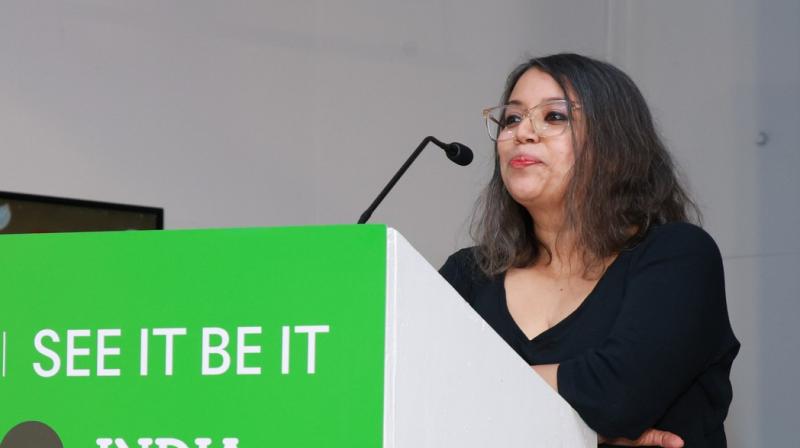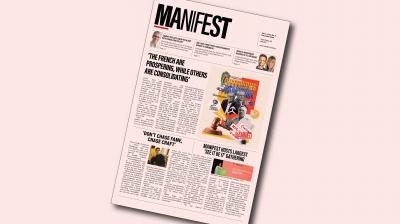At the inaugural edition of Cannes Lions’ See It Be It programme, which was hosted in Mumbai on 14 November by Manifest and Indian Creative Women, Pallavi Chakravarti, founder and CCO, Fundamental, spoke about ‘the fundamentals of starting up’. She structured her address around the word ‘entrepreneur’, using each letter of the word to examine a different aspect of starting up.
Rethink why you are starting
She began by urging aspiring entrepreneurs to thoroughly examine their motivations before launching a business. “Think about it, rethink it a 100 times. The first thing that you ought to be thinking about is why you are starting out. There is no right or wrong answer to it. There are a plethora of things you won’t find answers to the first time you have a conversation with yourself,” she said.
Chakravarti maintained that aspiring founders must be prepared to adopt a team-first mindset from the outset. She voiced, “Think about whether you can put the interests of your team, of the people that are going to be starting out with you, before your own interests. If you can’t do that, it’s not for you. No one is ever going to be ready, but the more you question, the more loopholes you find in your own thinking about what you want to do. You are more likely to walk away with clarity and take that plunge with clarity.”
The power of saying ‘no’
Addressing the early stages of establishing a company, she warned that rejection is an inevitable part of the process. She stated, “There will be a lot of people who will be standing on the sidelines and waiting to see if you can prove yourself. Reality hits when it comes to putting faith and money in you. You will be hearing ‘no’ a lot - from potential clients, potential talent, the people who you think would have taken a punt on you, but they haven’t. Developing a seriously thick skin is absolutely non-negotiable.”
Chakravarti also stressed the need to choose opportunities carefully, warning that taking on work that doesn’t fit can derail a company’s direction. “Start saying no because when you get into something and you have had your thousand rounds of hesitation prior to taking the plunge, you have some germ of an idea of what it is that you’re trying to build and why. Don’t ruin that by saying yes to any and everything that comes your way. You have to learn to start saying no to things that don’t suit your agency's agenda and aren’t in the best interest of your team,” she shared.
Prepare for conflict before it arrives
Chakravarti described partnerships as both crucial and complicated. “You’re going to want to kill your partner. Please accept that. Prepare for conflict before conflict arises and also make time for conflict resolution,” she noted.
She nudged the founders to surround themselves with people who think differently.
“Don’t pick clones of yourself. Diversity in the room is non-negotiable. Don’t hire ‘yes-men’. In your partnership and the people that you bring on board, make sure that there are people who can raise their voice, argue a point and take you on. Hire people who can take you on and are smarter than you.”
Plan your finances and know your worth
Underscoring the importance of financial preparedness, she stressed that founders must evaluate both their appetite for funding and investors’ expectations. “Talk to people and investors. Understand if you want funding or if anyone wants to fund you,” he said.
For those choosing to bootstrap, she warned that survival depends on having a reliable runway. “If you don’t have the money secured, think about how you’re going to fend for yourself and the team until the cash flow regularises. In absolutely no circumstance, get into this thinking ho jayega. If you’re going to be in it without the runway, don’t get into it,” she cautioned.
Chakravarti drew a clear distinction between profit and long-term sustainability. “Profit is an absolute number. Profitability is how effectively you are converting your revenue into profit. If your business is profitable, then it’s going to stay successful for a very, very long time. Think about every win, every loss and the long-term game plan. Profitability will only work if you can maximise certain jobs.”
Highlighting a key concern in the advertising industry, she added, “Know your worth. This is a huge problem in our industry. We don’t know our worth anymore. We don’t know what we’re bringing to the table. We are allowing people to sell themselves short, and this is not a long-term plan. If there are people who look at you and say, ‘we will find someone cheaper,’ - don’t worry about it. There will be somebody who will see what you’re bringing to the table and will be willing to pay the price. You can’t be creative or strategic on an empty stomach.”
Reflect, learn, and take responsibility
Chakravarti emphasised the importance of reflection for founders, noting that the early stages of building a business provide the rare luxury of stepping back and assessing what is working and what isn’t. “Please step back every now and then and think about the wins, the losses, the hits and misses. Analyse team breakdowns, processes, and structures. Don’t gloss over gaps, because they’ll come back and bite you. Don’t gloss over the hits - there is a difference between being a fluke and being a consistently well-oiled machine. All of this is critical for you to learn and emerge stronger,” she observed.
She also stressed the importance of accountability and strong leadership under pressure. “Mistakes will happen. Your team may let you down, and you may let yourself down. The key is to acknowledge it, learn, and not repeat the same mistake. Be there for your team. You need to be like Amitabh Bachchan in Sholay - jump in and take the bullet,” she said.
Find your niche
Chakravarti advised the room not to try to be a one-stop shop and build a specialisation. “No one is coming to you because you can do everything in the world. People should come to you because there is something you do that nobody else can. If you can find that narrative for yourself, you have a sure-shot win,” she said.
Stressing the importance of having a differentiator, she continued, “Have a USP and stay with it, because over time, when you build a body of work, it’s going to show and people will know why they are knocking on your door. Don’t be one size fits all.”
Focus on your own journey
Talking about the pressures faced by women entrepreneurs in particular, Chakravarti advised against constant comparison. “Women tend to put themselves under a scanner. This is not a sprint, and it’s not a contest. The race is only with yourself. Pace yourself - know when to pick up speed, know when to slow down.”

.jpg)









